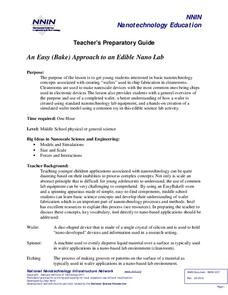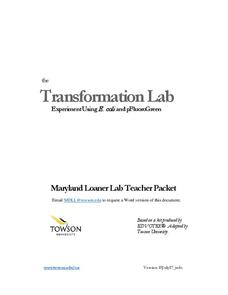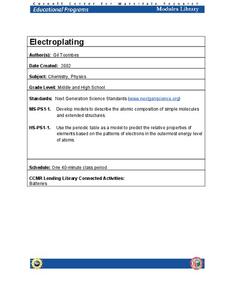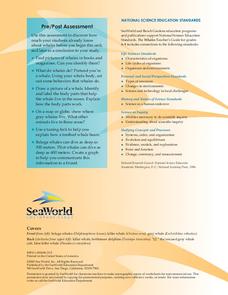Curated OER
Energy Source Puzzles
Students identify renewable and nonrenewable resources. In this energy source lesson, students participate in a game to identify the various types of resources. There are various extensions to this lesson, such as tic-tac-toe and memory...
Curated OER
Competition/Cooperation Relationships
Students view the PowerPoint slide of a lynx and hare and discuss what would happen if all the lynxes were destroyed. They then take notes on the lesson plan and brainstorm about other competitive/cooperative relationships as well as...
Curated OER
Observing Wind Speed and Cloudiness
Observiing the atmosphere is always a fascinating past time. In this science lesson, learners are encouraged to observe the wind speed and cloudiness present each day. The observations take place over a period of three days, and each...
Foundation for Water & Energy Education
Perpetual Flow Activity
Set up a demonstration of how gravity can drive the perpetual flow of water during your hydro power unit. Science learners work in teams to make observations and formulate questions about how it works. They compare the model to what they...
Teach Engineering
Ampere's Law
Help your class find the the magnetic field of a toroid, a solenoid bent into a circle with an activity that allows the class to see how a loop of wire carrying an electrical charge behaves much like a magnet. The resource provides...
Wild BC
The Greenhouse Effect: The Role of CO2
Though this is meant to be second in a two-part lesson, the two are not dependent on each other. Pupils play the roles of visible light rays, light or dark surfaces, and carbon dioxide molecules. They interact and react according to...
Curated OER
A Simple Motor
Instructions for building a simple electromagnetic motor are provided for the teacher. Aside from some sketchy background information and a list of content standards to be met, that is about all you will find in this resource. The motor...
Teach Engineering
Breathing Cells
Pairs work together to determine whether unknown solutions are either acids or bases by using a red cabbage indicator solution. After determining the general pH of the unknown solution, classmates blow into the same indicator after...
Curated OER
Outer Space Circus
Students investigate the concept of other planets and conduct research using a variety of resources. They focus upon a planet and its gravitation, surface, and atmospheric conditions. The lesson plan contains specific steps for the...
Teach Engineering
Changing Fields
Eddy currents, Faraday's Law and Lenz's Law provide the connection between train brakes and and MRI machines in a instructional activity that asks teachers to provided the material needed so the pupils can understand the properties of...
Towson University
Chestnut Tree Lab
What will your class learn in a curious tale of a fungus, a virus, and a chestnut tree? Biology scholars discover the world of viral biocontrols through a DNA restriction lab. Groups research the decline of the American chestnut tree at...
Sea World
Ocean Discovery
Immerse your young marine biologists in the world of marine animals. The lesson includes several activities that are age-appropriate for preschoolers and kindergartners, including coloring pages, gluing feathers and sand onto paper...
National Nanotechnology Infrastructure Network
An Easy (Bake) Approach to an Edible NanoLab
You can make it if you bake it! Young scientists model electronic chip fabrication with an easy bake oven. They create a design to embed in their brownie "chips" and compare their models to wafer production in basic nanotechnology.
Towson University
Transformation Lab
Transform your class' understanding of genes and antibiotic resistance with the Transformation Lab. Junior geneticists create and observe their own resistant strains of E. coli through research, discussion, and experimentation. The...
Science 4 Inquiry
The Impact of the Sun and Moon on Tides
In 150 BC, Seleucus of Seleucia theorized that the moon causes the tides. Scholars learn about what causes tides by studying the interactions of gravity between the sun, moon, and Earth. They use technology to formalize otherwise...
National Nanotechnology Infrastructure Network
Introduction to Nanotechnology Using the Creative Problem-Solving Model
Should we continue to spend money on nanotechnology? Groups engage in a problem-solving unique process around the newly emerging research field of nanotechnology. In order to propose a solution, the groups must research nanotechnology...
NOAA
Waves
Is it possible to outrun a tsunami? After watching a presentation that explains how waves and tsunamis occur, class members investigate the speed of tsunamis triggered by an earthquake.
Cornell University
Nano Interactions
Tiny particles can provide big learning opportunities! Middle school scientists explore the world of nanoparticles through reading, discussion, and experiment. Collaborative groups first apply nanotechnology to determine water...
Cornell University
Electroplating
Silver pennies and copper nickels are made possible by applying some chemistry. Learners use electrolysis to coat a penny with zinc sulfate and a nickel with copper sulfate. Their investigation builds an understanding of electroplating...
Agency for Toxic Substances and Disease Registry
Don't Mess with Mercury (Lesson C)
The health effects of mercury exposure if the focus of the first of three activities about the properties of metals. Pairs research mercury to write, prepare, and share posters, articles, or PSAs with the class.
Sea World
Whales
A whale of a lesson is sure to intrigue your elementary oceanographers! Learn about the mammals of the sea with a series of activities about whales, dolphins, and porpoises. Kids complete worksheets about the anatomy of a whale, create a...
Chicago Botanic Garden
Faces of Climate Change
How does climate change affect you? First in a three-part series, the activity focuses on how individuals living around the world are affected by climate change. Individuals take on the role of a given character and share their...
University of Minnesota
Beautiful Brain: Do You See What I See?
Can art play tricks on your eyes, and can a still painting really appear to vibrate? The second lesson in a four-part series discusses the way our beautiful brains translate visual images. It highlights the style of optical art and...
University of Minnesota
Beautiful Brain: Step Inside the Brain
Before digital microscopes, scientists hired artists to draw the things visible in the microscope. Through training in neuroscience and art, Cajal revolutionized the way we view the beautiful brain. The third instructional activity in a...























